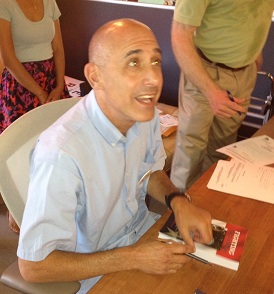How do you document a historical movement and political battle in America? Richard Kirsch’s book Fighting For Our Health is such a documentation about his experiences being on the frontlines of the battle to pass the Affordable Care Act.
It was a pleasure to hear Richard Kirsch speak about his book at the California Endowment and graciously introduced by his long time friend and Executive Director of Health Access Anthony Wright.
With a little help from my friends…
Even though President Obama made healthcare reform a center piece of his 2008 campaign, Fighting For Our Health illustrates how integral the numerous grassroots organizations along with Health Care for America Now (HCAN) were in creating the political will and momentum for passage.
In his book, Kirsch leads us through the creation of the politically important HCAN independent coalition and the political battles that were to ensue. As the National Campaign Manager for HCAN, Kirsch was on the frontline when reform would come under attack from the Tea Party, reluctant congressional Democrats, media personalities and the White House itself. Kirsch details one such surprise when he received a call from Andrew Grossman, White House liaison to Health care advocates:
“He [Grossman] was angry because members of the HCAN Steering Committee had agreed to each send a letter to Baucus and Reid expressing concerns about the Senate Finance committee bill. The White House wanted the letters to stop, worried that if a letter were leaked to the press, it would look like some of their allies were unhappy. (Which we were!) I told Grossman that he could not stop us from lobbying for the bill we wanted; that was core to our mission” Pg 263 – 264
Kathy DahlKemper did what?
Fighting For Our Health will become an important reference work for historians in the future. Kirsch
Fighting For Our Health The Epic Battle To Make Health Care A Right In The United States by Richard Kirsch
does a very good job of detailing the minutia of strategically important details involving elected officials and stakeholders. This is important because it provides a framework in which to understand how certain political and reform language decisions were arrived at.
HCAN was instrumental in persuading and supporting congress members such as Kathy Dahlkemper from Pennsylvania who represented districts with constituencies that were catholic, blue-collar and had high population of seniors. It was politically risky for Dahlkemper to vote for the ACA when her district had a natural inclination to be against it.
Oh my gosh, don’t remind me
Few of us remember the roller coaster ride that was the birthing of the health care reform legislation spilled out on the evening news every night. As I read the book I was struck with how many times I thought, “Oh yeah, I forgot about that (public option, big pharma buy off, cornhusker kickback, etc.)” For better or worse, Kirsch helps us remember the highlights and gives us the background on the “army” of volunteers that were working for health care reform.
KISS, Keep It Simple Stupid
Now that the ACA has been passed and affirmed by the Supreme Court, it is Kirsch’s view that a simplified message needs to be broadcast to the millions of Americans who will be affected by the law. This brought a grin to my face because that is what I have been attempting to do with a series of blog post called “Heathcare Reform Simplified”. There is a flurry of regulatory hearings, activities, and rulings that are important, but detract from the message: “Here is how you will be able to get affordable health insurance.”
You can’t please everyone
One attendee to Kirsch’s book signing and introduction groused that Obamacare was not single payer plan. As he explained, a full blown single payer system was never a political reality. While Americans may not be in love with their health insurance company, they have even more angst about a health care system directed by government.
Fighting For Our Health may not be a political thriller that will keep you reading late into the night, but I promise a few surprises and truly a new perspective on the herculean effort it took to get the historical Affordable Care Act on to the President’s desk.
